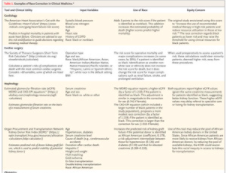Filter resources by type or complexity
All AdvancedArticleBeginnerCase StudyIntermediatePodcastReportResearch PaperVideoInfluence of Skin Type and Wavelength on Light Wave Reflectance
The intent of the study was to determine the influence of skin type and wavelength on light reflectance for pulse rate detection. PPG sensors detecting changes in blood flow are assessed for effectiveness on dark and light skin tones. Studies have shown that green light lacks precision and accuracy, and may not read at all […]
Read More
Accuracy in Wrist-Worn, Sensor-Based Measurements of Heart Rate and Energy Expenditure in a Diverse Cohort
The ability to measure physical activity through wrist-worn devices provides an opportunity for cardiovascular medicine. However, the accuracy of commercial devices is largely unknown. The aim of this work is to assess the accuracy of seven commercially available wrist-worn devices in estimating hea… This research paper assesses the accuracy of seven commercially available wrist-worn devices, […]
Read More
Use of AI-based tools for healthcare purposes: a survey study from consumers’ perspectives
This study sheds more light on factors affecting perceived risks and proposes some recommendations on how to practically reduce these concerns. The findings of this study provide implications for research and practice in the area of AI-based CDS. Regulatory agencies, in cooperation with healthcare… This paper examines AI-based tools for healthcare from a consumer’s perspective. […]
Read More
Bias at warp speed: how AI may contribute to the disparities gap in the time of COVID-19
Abstract. The COVID-19 pandemic is presenting a disproportionate impact on minorities in terms of infection rate, hospitalizations, and mortality. In terms of infection rate, hospitalisation and mortality, the Covid-19 pandemic presents a disproportionate impact on minorities. Many believe that artificial intelligence could be a solution to guide clinical decision making to overcome this novel disease. […]
Read More
If AI is going to be the world’s doctor, it needs better textbooks
Artificial intelligence in healthcare currently reflects the same racial and gender biases as the culture at large. Those prejudices are built into the data. AI technologies are being used to diagnose Alzheimer’s disease by assessing speech. This technology could aid early diagnosis of Alzheimer’s. However, it’s evident that the algorithms behind this technology are trained […]
Read More
The Need for Use of Race Correction in Clinical Algorithms
Medicine and Society from The New England Journal of Medicine — Hidden in Plain Sight — Reconsidering the Use of Race Correction in Clinical Algorithms Physicians still lack consensus on the meaning of race within medical science; there is an ongoing debate as to whether racial and ethnic categories can reflect underlying population genetics, and […]
Read More
Addressing Bias: Artificial Intelligence in Cardiovascular Medicine
As the leading cause of morbidity and mortality worldwide, cardiovascular disease is prevalent across all populations. Artificial intelligence (AI) is providing opportunities to transform cardiovascular medicine. Medical report which examines the potential of Artificial Intelligence in cardiovascular medicine; it could hugely benefit patient diagnosis and treatment of what is the leading cause of morbidity and […]
Read More